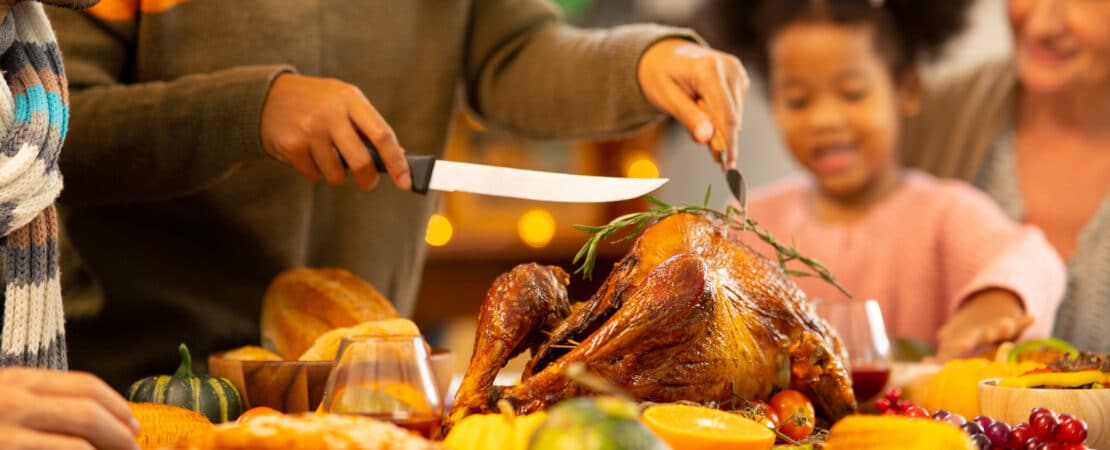Thanksgiving can be a nightmare for people with celiac disease.
While everybody else looks forward to stuffing themselves, someone with gluten issues must worry about which dishes are safe and which may contain wheat, which causes their digestive system to go haywire.
Now, a new two-part study shows that celiac sufferers not only don’t have to fret about the main dish on Thanksgiving, they may want to go for seconds.[1]
Researchers have long wondered why only about 1% of the world’s population suffers from celiac disease when 40% have the gene for the illness.[2]
A study published in the journal Science Translational Medicine concluded that the answer may be tryptophan. It’s an amino acid present in high amounts in turkey.
In the first part of the study, researchers at McMaster’s University studied tryptophan metabolism in three groups of people. One group had active celiac disease. Another group had been on a gluten-free diet for two years and had no symptoms. The third group was healthy people without celiac or gluten intolerance.
The scientists found that people suffering celiac symptoms had lower levels of tryptophan. And the bacteria in their intestines was less able to metabolize the tryptophan they had.[3]
The lack of tryptophan and the ability to absorb it appears to be what triggers the gut inflammation that causes celiac, the researchers wrote.
Celiac: How Probiotics Help
The second part of the study looked at mice with celiac disease. Researchers found that a high-tryptophan diet reduced gut inflammation. And so did feeding the mice the probiotic lactobacilli. The probiotic helped metabolize tryptophan, which further reduced inflammation in the intestines.
The researchers wrote that tryptophan along with probiotics “may help (celiac sufferers) heal and respond better to a gluten-free diet.”
They concluded: “People with celiac disease may find themselves more comfortable with extra Thanksgiving turkey.”
5 Foods High in Tryptophan
Tryptophan is an essential amino acid. That’s means your body can’t make it. You have to get it through foods or supplements.
Tryptophan is best known for supposedly making people drowsy. Turkey’s high tryptophan content was thought to be the reason people feel sleep after Thanksgiving dinner.
It turns out that this is a myth.[4]
Turkey is a great source of tryptophan, but it’s not unique. Many other foods besides turkey have comparable amounts…chicken, for example.[5]
Here are five foods high in tryptophan. Amounts are listed per 4-ounce serving:
- Pumpkin seeds, 576 mg
- Chicken and turkey, 404 mg
- Beef skirt steak, 374 mg
- Pork chops, 369 mg
- Salmon, 335 mg
Based on the new study, people with celiac or gluten intolerance may want to eat more of these foods along with a probiotic supplement. Tryptophan is also available in supplement form.
So if turkey isn’t the cause of your Thanksgiving sleepiness, what is?
Dr. H. Craig Heller of Stanford University said drowsiness is triggered by how much you eat, not what you eat. “Studies have indicated that stretching of the small intestine induces sleepiness,” he said.[6]
The bottom line?
If you have problems with gluten, eat plenty of turkey. But if you want to avoid a post-Thanksgiving coma, go easy on the other dishes.
Editor’s Note: Celiac and other autoimmune illnesses are now more prevalent than heart disease or cancer. Go HERE to read our monthly journal Independent Healing to learn why our bodies are attacking themselves…and what you can do to stop it.
Related Articles
Is This the Real Cause of Celiac Disease?
The Gluten-Free Grain Every Active Adult Should Eat
8 Weird Pooping Habits Explained by Science
[1] https://stm.sciencemag.org/content/12/566/eaba0624
[2] https://www.eurekalert.org/pub_releases/2020-10/aaft-tri101920.php
[3] https://www.eurekalert.org/pub_releases/2020-10/mu-mtd102120.php
[4] https://www.scientificamerican.com/article/fact-or-fiction-does-turkey-make-you-sleepy/
[5] https://www.myfooddata.com/articles/high-tryptophan-foods.phptry
[6] https://www.scientificamerican.com/article/fact-or-fiction-does-turkey-make-you-sleepy/

